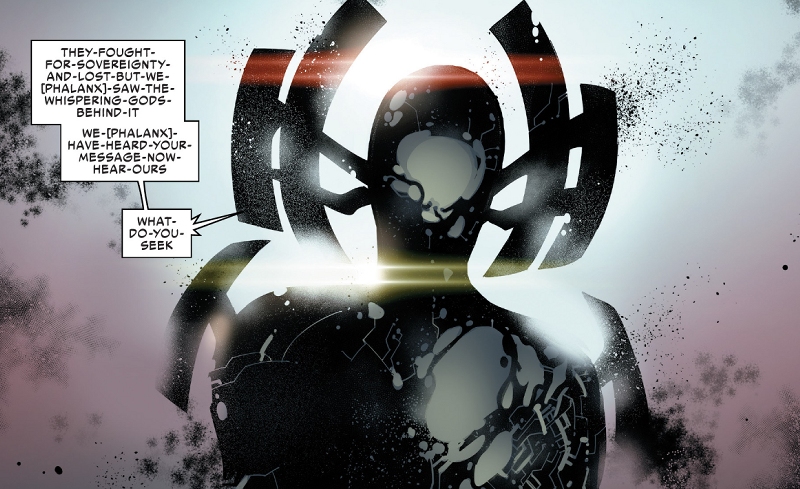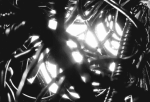
It was expected that after the hype that preceded and accompanied the previous issue what was going to follow would lose some of that tension, like a valley after the peak. Even the side-series title, being “Powers”, seems to be focused on expanding the range, and observing the ripples of the major events or revelations that instead happen in “House.” So it was expected that this part would be a little blander.
Here’s what I think: this issue is really quite bad, actually, but it ends up serving on the plate more than I expected. It’s still bad, but it’s not an “empty serving”, waiting for the following weeks to re-up the stakes.
What’s bad follows the bad that was already there in all the previous issues. There’s no story moving, it’s all a vague concept slapped on the page, and we keep getting these poorly written cameos of characters that make the little story that might be there feel fragmented and pointless. Only it’s much worse this time. Nothing that is shown in this issue adds anything we didn’t know, or something that could be considered meaningful.
The first scene was probably mandatory, the “necessary” meeting between Xavier and Magneto, to show us how they ended up on the same side. But the motivation behind all this was shown already in the previous issue: it’s Moira’s jedi mind-trick. This time we only observe it being repeated (to Magneto instead of Xavier), and still looking very implausible despite the motivation holds (you know, you don’t usually trust someone who can manipulate your mind). I can only judge this in the perspective of all the confrontations between Xavier and Magneto I’ve read before, and this is just awful. The dialogue is surreal, and there’s zero substance to it. It’s worse than ever. But then it all also pivots around Moira’s trick, so it becomes a perfect example of the “show, don’t tell” rule. Nothing is being shown because everything is implicit in that mind-trick working its magic. Then, everything that instead surrounds that scene, all those interactions and dialogues, are some of the worst stuff I’ve ever read. It’s filled with non-sequitur and dramatic proclamations that are completely out of place (and out of character). Even if we’re given a motivation to explain why these characters now act differently, they just don’t act and speak in a way I can find plausible. It’s all surreal in the worst way, like the most artificial of stages.
What follows is less impactful so also less irritating. If the previous scene was necessary as it showed a crucial event, but superfluous as it added nothing to what we already knew, the next scene works more like a recap whose purpose is thematic, in the flow of the story here, but only becomes clear at the very end. Being this “Powers”, it looks like it follows the format of time jumps, so after that scene in year zero, we move to year ten, to tell us the X-Men are worried about the rise of the machines. No more no less than a mix of the first two parts of this story. This continues to be bad, as the most dramatic exchange is Xavier saying to Cyclops: “Listen to me Scott… … …They have to be stopped.” You really can feel the drama. Then Cyclops, who obviously doesn’t want to be any less cool, goes: “…Does it need doing?” Xavier: “Yes.” Cyclops: “Then it will be done.”
Wow… These dialogues are INTENSE. Or maybe not, they read like awful action movies scripts. Out of bounds rhetorical melodrama.
The next jump goes 100 years in the future, where a particularly ugly Wolverine and friends are still fiddling with the same USB drive they stole in Powers #1. The big revelation here is that… it contains data! Actually not the data they need, but data on the location of more data… that they might find useful to launch a suicide mission. And we find out that the eighth guy on the satellite that wasn’t revealed in Powers #1 is actually Apocalypse. Betting on the shock power of seeing a villain leading our heroes… that might even work if this trick hadn’t already been used in all previous issues as well. Now we just expect it, and still don’t find it any more credible.
But the big picture of this issue is that these scenes belonging to different “eras” actually align to show or suggest a trajectory. A theme. Year ten Xavier is worried about Nimrod being built, and year hundred Apocalypse launches an attack against a naughty (and frankly ridiculous) Nimrod again, suggesting that something might have gone wrong, or not entirely straight-forwardly, with Cyclops’ boisterous plan to neutralize Nimrod before it was made.
And this is where the issues gets interesting and moving a step away from the pointless acts of a rather bad and also plain story. You focus on Nimrod, but Nimrod is not the end. It’s the mean to the end. Moving to year 1.000, the game on the table is blown up, to give the sense that the petty human shenanigans that demand so much drama and monopolize passions, are nothing (or baby steps) in the much wider context. Realms. Exponential levels of reality. As in that scene in Man in Black where the two alien creatures play marbles with universes. The staggering, exhilarating sense of inconceivable inhuman scale.
The problem in all this is that the most important part is delivered through a text page at the end. What we have, again, isn’t a well told story, but a cool concept explained with an info-dump. It can be cool and it builds its own cute iconography, but it’s just another concept added to the pile. I can appreciate the intention of building something big and that does something interesting on multiple levels, but it all feels a rough sketch of ideas piling up and being assembled in rather haphazard way. It shows reach, but it doesn’t show competence (or wisdom, or depth).
The result is that Hickman wants to do a million of things, but clearly doesn’t have the time and space to do well any of them.
Those layers of reality are one of the concepts I really like, so I was positively surprised. But it’s certainly not enough, and not fair to applaud just because Hickman used it. That said, we are at comic-book type of bland simplification, so I cannot even really appreciate what is being done. It’s cool that we can imagine there’s more to existence than something anthropomorphic, but the “machinic” represents an outside, not a glorified inside. Hickman instead just aligns to the banality of “intelligence.” And there’s nothing revolutionary there. We’re still toying with human-made myths.
Mythological gods weren’t alien and external, they were just symbols of human passions. Sublimations. In the same way, these exponents of reality (Phalanx) that Hickman shows are just bigger eaters. That’s fine, but it’s not new, or meaningful.
Hickman keeps adding pieces to this new universe, that certainly isn’t the Marvel Universe. We’ll see if he ever manages to do something interesting with it. For now we are just being shown how it works.


One Comment
While I am not as critical of the series thus far, I do agree with your central concerns. I admire the grand scope and ambition but I resent the delivery. Hickman usually does info dumping through texts but it is overused. While I can allow for some behaviour to be related to mind control, surely you can still write a better scene than that Cyclops one and Xavier/Magneto.
Even worse is that I smell the same annoying storytelling approach as Westworld Season 1. Deliberate and unnecessary obfuscation, ambiguity or omission of key plot points to fool the reader into thinking the story is more complex or mysterious than it actually is. I consider that a sign of pretentiousness (as you rightly point out). Everyone thinks they can be Lynch these days. I will follow the series for now, but I am already gearing up for the same reaction I had at the end of Westworld’s first season: “all that ambiguity, smoke and mirrors to deliver this straightforward story?”